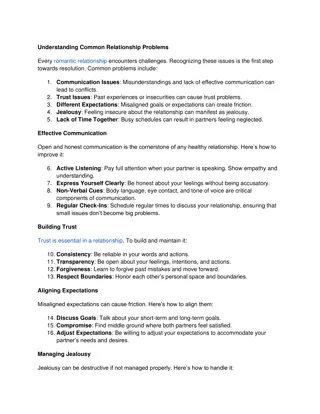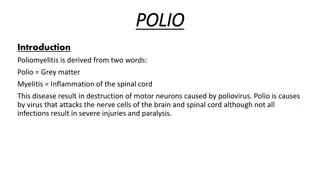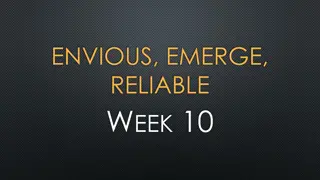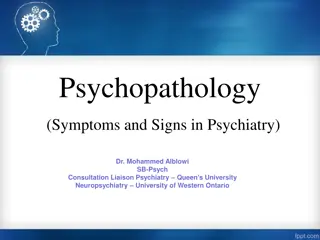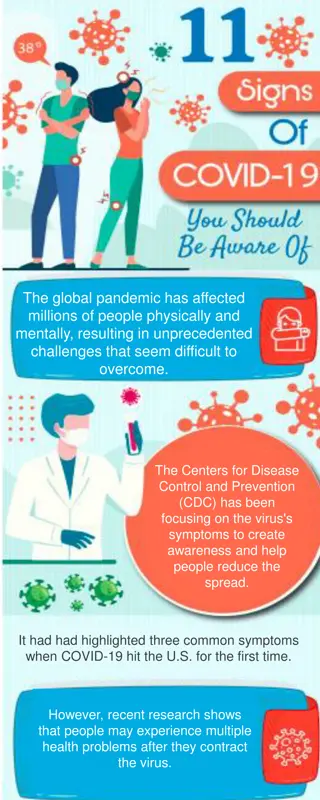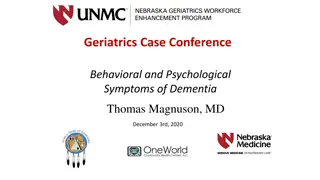General Symptoms of Neurosis: Work Issues, Relationship Problems, and Envious Behavior
Neurotic behaviors can impact work relationships, basic needs, and personal interactions. Symptoms include trouble at work, relationship issues, being a drama queen, excessive sadness over minor events, and reacting negatively to neutral events. Envious behavior and difficulty sticking to routines are also common. Understanding these symptoms is crucial in identifying and addressing neurotic tendencies to improve overall well-being and work performance.
Download Presentation

Please find below an Image/Link to download the presentation.
The content on the website is provided AS IS for your information and personal use only. It may not be sold, licensed, or shared on other websites without obtaining consent from the author.If you encounter any issues during the download, it is possible that the publisher has removed the file from their server.
You are allowed to download the files provided on this website for personal or commercial use, subject to the condition that they are used lawfully. All files are the property of their respective owners.
The content on the website is provided AS IS for your information and personal use only. It may not be sold, licensed, or shared on other websites without obtaining consent from the author.
E N D
Presentation Transcript
B.A. PART I (H) 18TH MAY 2020 KUMARI RANJEETA GUEST FACULTY M. L. ARYA COLLEGE, DEPTT. OF PSYCHOLOGY E-mail- bkranjeeta@gmail.com Mb. No.- 8969020842
18 MAY 2020 B.A. PART I (H) PAPER III, UNIT II (SYMPTOMS DISORDER) GENERAL SYMPTOMS OF NEUROSIS II 11. Trouble Getting Along at Work: People who behave in neurotic ways typically have trouble getting along with others at work. Social neurotic behaviors like being needy, whiny, dependent, or argumentative can take a toll on your business relationships and keep you from succeeding at work. 12. Difficulty Taking Care of Basic Needs: Neuroticism can even keep you from taking care of your basic needs. If you feel unwarranted sadness or anxiousness, you may find it difficult to complete routine personal care tasks like bathing and grooming.
18 MAY 2020 B.A. PART I (H) PAPER III, UNIT II (SYMPTOMS DISORDER) You may also have trouble sticking to a healthy eating plan or getting enough sleep because every little disturbance makes you feel anxious and overwhelmed. 13. Relationship Problems: Relationship problems are common for people who behave in neurotic ways. They might nag, whine, and expect their partner to do things they could do for themselves. They may try to control their partner, or they may accuse them of being unfaithful without any evidence of cheating. 14. Being a "Drama Queen : The term "drama queen" is very popular, especially on social media. A drama queen can be anyone, male or female, who stirs up controversy among their friends or makes a big show of emotion about minor incidents.
18 MAY 2020 B.A. PART I (H) PAPER III, UNIT II (SYMPTOMS DISORDER) When you make everything a big, dramatic production, you not only make yourself miserable, but you also disrupt others' ability to have a peaceful day. 15. Excessive Sadness Over Minor Events: There's nothing mentally unhealthy about being sad over a major loss. However, sadness, crying, or staying in bed over small setbacks can indicate neurotic behavior. Maybe you lost the pen you used to sign the mortgage on your first house. Maybe your child showed a new sign of maturity. A moment of sadness might come, but when you foster it and let it grow until it affects your functioning or temperament, that's neurotic behavior.
18 MAY 2020 B.A. PART I (H) PAPER III, UNIT II (SYMPTOMS DISORDER) 16. Envious Behavior: People who display neuroticism are often very envious of others. You want to have the possessions that others have. You want to have their opportunities or advantages. You want to be them. You express these desires with neurotic behaviors like sabotaging, begging others to give you what they have, or even stealing. 17. Reacting Negatively to Neutral Events: Sometimes, the event that upsets you is neutral, but you react with a habitual negative response. For instance, your mail carrier might place a package on your doorstep rather than knocking first to get your attention. If you get upset anyway, even though you heard the carrier, saw the carrier, and received the package without a hiccup, then this a clear sign of neurotic behavior
18 MAY 2020 B.A. PART I (H) PAPER III, UNIT II (SYMPTOMS DISORDER) 18. Panicking in Relatively Non-Threatening Situations: It's natural to panic in threatening situations. It's part of your ingrained fight-or-flight response. However, if that response system kicks in when nothing is threatening in your environment, neuroticism is likely prompting your unnecessary panic. 19. Displaying Emotional Instability: Because you're so easily thrown off balance by even the smallest events and circumstances, you behave in unstable ways. You may seem to be doing fine one minute and then get angry the next; this might be followed by sadness a few minutes later. No one can count on you, and all of your relationships suffer.
18 MAY 2020 B.A. PART I (H) PAPER III, UNIT II (SYMPTOMS DISORDER) 20. Inability to Function in Everyday Life After an Unrelated Trauma: PTSD could be considered a type of neurotic behavior. You may have had terrifying experiences in a war, and if the sound of fireworks going off triggers a relapse, then you have experienced a neurotic episode. Similarly, you may have been abused by a parent when you were a child, and if you feel scared when you are alone around another adult, then you might be experiencing neuroticism.





